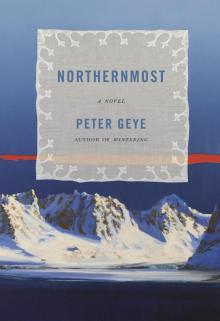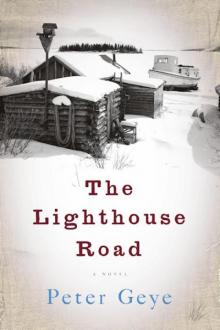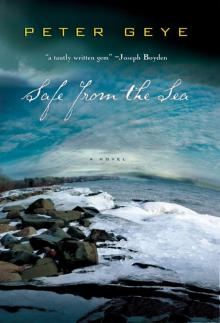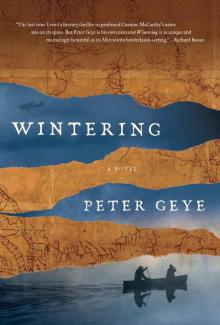- Home
- Peter Geye
Northernmost
Northernmost Read online
ALSO BY PETER GEYE
Safe from the Sea
The Lighthouse Road
Wintering
THIS IS A BORZOI BOOK PUBLISHED BY ALFRED A. KNOPF
Copyright © 2020 by Peter Geye
All rights reserved. Published in the United States by Alfred A. Knopf, a division of Penguin Random House LLC, New York, and distributed in Canada by Penguin Random House Canada Limited, Toronto.
www.aaknopf.com
Knopf, Borzoi Books, and the colophon are registered trademarks of Penguin Random House LLC.
LIBRARY OF CONGRESS CATALOGING-IN-PUBLICATION DATA
Names: Geye, Peter, author.
Title: Northernmost / by Peter Geye.
Description: First edition. | New, York : Alfred A. Knopf, 2020. | “This is a Borzoi book.”
Identifiers: LCCN 2019019921 (print) | LCCN 2019021191 (ebook) | ISBN 9780525655763 (ebook) | ISBN 9780525655756 (hardcover)
Classification: LCC PS3607.E925 (ebook) | LCC PS3607.E925 N67 2020 (print) | DDC 813/.6—dc23
LC record available at https://lccn.loc.gov/2019019921
Ebook ISBN 9780525655763
This is a work of fiction. Names, characters, places, and incidents either are the product of the author’s imagination or are used fictitiously. Any resemblance to actual persons, living or dead, events, or locales is entirely coincidental.
Cover image: Losvik Cut (detail), oil on canvas, 2013, by Beau Carey
Cover design by John Gall
ep_prh_5.5.0_c0_r0
Contents
Cover
Also by Peter Geye
Title Page
Copyright
Dedication
Epigraph
The Eide Family
Prologue
Part One: Draugen
1897
2017
1897
2017
1897
2017
1897
Part Two: The Fonn
1897
2017
1897
2017
1897
2017
1897
2017
1897
Part Three: Vannhimmel
2017
1897
2017
1897
2018
1900
Epilogue
Author’s Note
Acknowledgments
A Note About the Author
For Eisa
and
For Emily
Oh that burning longing day and night were happiness!
—Fridtjof Nansen, Farthest North
PROLOGUE
Each night she leaves the light on in the front window and walks the cove shoreline out to the point and from across the water tries to believe she lives there, in the warm and quiet glow of the fish house. So many nights during the last year—the hardest of her life—after working all day on the house or at her desk, she’s come out here to take comfort in the surging waves. My, how they keep coming. But for weeks the cove and even the lake out beyond the point have been frozen. The cold tonight will make the ice stronger. The snow will make it softer.
Her grandmother once painted the fish house from this vantage. Back in the 1940s, when she was first a bride and still in love with the idea of living here. That painting, along with five others, hangs in the historical society on the Lighthouse Road. It’s titled Fish House in Snow Squall, and from where she stands now Greta can see it as she imagines her grandmother might have, even if she’s standing in a blizzard, not a squall. The trees on the point sway in the gusts, their blackness a shifting smudge against the snowlit sky.
“You’re doing it again, Mom,” Liv says, her voice pinched on the wind.
Greta steps closer. “Doing what, love?”
“Talking out loud.”
“I was thinking about my grandma.” Greta brushes the snow from Liv’s hat and sees its reflection in her daughter’s eyes. “She was an artist. Her paintings are in the historical society. You’ve seen them.”
“The one of the fish house,” Liv says.
“That’s the one I was thinking of.”
“It’s not the same fish house anymore.”
Greta imagines some pride in her daughter’s voice. “It certainly isn’t.”
Together they look back across the cove, the wind biting their faces. Usually the radiance from town a half mile across the isthmus comes up over the trees, but tonight the snow blots even that out. The only thing alight in any direction is the window.
“Axel!” Liv hollers as the dog chases a whorl of snow blown up off the ice. “Come here, boy!”
“He’s okay,” Greta says. “The snow’s got him excited is all.”
Now they watch him bound off. Liv’s crazy about him, a giant mutt that looks as much like a bear as a dog. At two years old, he weighs a hundred and thirty pounds. His paws are as big as Liv’s feet. Perfect for the snow.
“The wind’s so quiet without the water,” Liv says.
Greta’s heard that before, and wonders whose expression it is. Her mother or father? Her grandfather? It can’t be Frans, can it?
“If it wasn’t snowing, would the wind sound the same?” Liv asks.
Greta puts her ear up to the night, as though listening for birdsong, and says, “I don’t think so. If it weren’t snowing, it would sound more like a scream. This is almost like someone whistling. Or humming.”
Axel comes barreling out of the darkness, storming into Liv’s legs and knocking her down. She laughs and bounces up and tries to tackle him but misses. Axel circles back and Liv gets up again and pushes her hat up off her eyes and together the two of them start toward the fish house. Greta watches them running, can hear Liv’s laugh carried on the wind. Before they’re halfway across the cove, the light in the window wavers and, on the ebb of another strong breeze, the house goes dark.
In the closet off the mudroom, Greta finds the lantern and a box of wooden matches and she lights up the mantle and they go into what she’s now calling the great room. A fire still smolders in the fireplace and Greta rekindles it while Liv collapses on the leather chair. Axel shakes the snow from his coat and lies on the rug. The house is warm, but without power the new bedrooms up in the loft will soon get cold.
“We’d better sleep down here,” Greta says.
“Like a slumber party.”
“I’ll go get blankets and pillows. You brush your teeth.”
Greta goes upstairs for Liv’s bedding and the stuffed polar bear she’s lately been sleeping with again. She grabs her own comforter and another pillow and heads back downstairs. It’s so quiet inside. Only the snap of the fire and the dog’s heavy sighs and, out in the night, the wind through the darkness.
* * *
—
Before she’d done all the work on the house, the wind had flowed through it like water through a fishnet. But with the new fireplace and chimney and the loft, with the new windows and roof, the place has been trued and now the wind’s kept outside. Greta arranges Liv’s pillow and quilt on the big chair and spreads her comforter on the sofa.
Liv comes out of the bathroom and jumps in the chair. “Will it stay warm enough with just the fire?”
“I think so,” Greta says.
Liv reaches down for the dog. “I can sleep on the floor with Axel if I get cold. He’d love that.”
Greta smiles at her daughter’s easiness. She hasn’t seen much of it recently. Liv’s only eleven years old. Eleven going on eighteen, what with all the mood swings and surliness, the back talk and pitting herself against the world, the unexplained tears and desperate hugs. Of course, Greta feels responsible for all of it. How many times each day does she agonize over Liv’s mood? How much time does she spend wondering if her daughter will be all right? How much are her own choices going to cost her daughter? And her son, Lasse, too, who is staying the night up at his grandpa’s house?
“I’ll be up working for a while,” Greta says. “I’ll keep the fire going. Maybe the power’ll come back on.”
“Are you still writing the family story?”
Greta sits down and spreads Liv’s quilt and kisses her forehead. “I’m almost done.”
“Is it a true story?”
“Sort of.”
“Are the people happy?”
“Are you okay, sweet pea?”
Liv rubs her eyes and looks like she’s about to sulk. Instead she says, “It’s tomorrow we go home, right? And Dad will be there?”
“That’s right. We’ll leave after breakfast. Dad’s on his way home now.”
Liv yawns deeply and when her eyes open again they catch the light from the fire. “I can’t wait to see him.”
“He’s excited to see you too.”
“Why’s he gone so much?”
Greta smooths Liv’s hair. “I think you should talk to him about that when you see him.”
Liv yawns again.
“I love you, kiddo,” Greta says.
Liv rolls on her side, facing the fire. “I love you back.”
Greta gets up and takes the lantern off the coffee table and heads over to her desk.
She also built this. One day last fall, she’d gone up to a farm on County Road 7 to see about some old siding advertised on Craigslist. The unmoored barn had slipped from its foundation years earlier and seemed ready to collapse altogether, but the owner assured her it was safe to go inside, which they did. The same clapboard siding that covered the fish house was stacked in the haymow. It was a miracle, frankly, to have found it. She was about to start hauling boards out to her truck when she saw, in another corner of the barn, a workbench, the top of which was a chunk of white pine four inches thick and thirty square feet. When she asked about it, the man said, “Take everything. It’ll be less to burn.” Together they loaded the wood onto the trailer behind her truck. And on a warm day in October, after the loft had been sided, she’d stood outside and sanded and planed and varnished the top of the workbench. She built new legs from cedar posts and now it sat in the corner, up against the window.
Greta looks around the fish house at everything else she’s done. The loft bedrooms are the most notable addition. Three small rooms up an open staircase, one each for her and the kids. There’s the mudroom and closet beneath the staircase. She built the kitchen along the north wall and a small island where four barstools sit under the counter. The wall facing the lake is all window, divided into three floor-to-ceiling panes. The floors throughout have been refinished and shine beautifully. Especially against the fire in the hearth.
The fireplace is her favorite part of the renovation. She and the kids picked the rocks from the river up by her father’s house and they cover a third of the wall opposite the kitchen. She had the hearth and flue installed but did the stonework herself, straight up to the tip of the chimney. Two solid weeks of backbreaking toil that had also been her best therapy.
* * *
—
She hears the fire snap, then a gust outside. She steps to the window. It still unsettles her to be here without the creaks and moans, especially on a howling night like this. She cups her hands around her eyes and peers out the window. The snow blows toward the lake, falling and dancing up off the ground at once. But Liv was right. Without the lake—without any waves—the wind in all its fierceness seems almost hushed.
That’s it: her mother used to call a north wind a quieting wind, because it blows the water away from shore. God, she misses her mother. Greta supposes it’s thanks to the many things she learned from her that she was capable of remodeling the fish house. And strong enough to have come back home to live in it. Strong enough to have found him, and to have insisted on him, despite the long odds against them.
He also spoke of the northern wind. In the first letter he sent, more than a year ago now, he wrote that she should think of it as a gift. That he’d send the breath of Boreas when he missed her most, up over the pole and on down to her. He wrote things like that, things that she read as both poetry and promises. He sent her other things too. A stone picked from the hills above Hammerfest. A bronze lighthouse figurine, small enough to wear on a charm necklace. A compass. A fountain pen. And his first and most amazing gift, that slight book and his translation of it, his penmanship so fine and precise it could have been typeset on some antique press. The original is leather-bound, with a polar bear from the shoulders up, its forepaws raised above its snarling face, embossed beneath the title: Isbjørn i Nordligste Natt. The Polar Bear in the Northernmost Night. Fifty-four pages chronicling a fortnight in her great-great-great-grandfather’s life, published by some man named Marius Granerud in Tromsø, Norway, in the year 1898.
After reading it more times than she can count, she’s still surprised by something she can only describe as being haunted each time she looks at it. That her family, as far back as it’s known to her, has been suffering the cold and snow of this world as though these are the conditions of their natural and only habitat. It’s like a confirmation of who she is. And that the stories of her father’s and great-grandfather’s bears should likewise have their provenance? This helps her believe in the manuscript pages stacked on the corner of her desk. She reaches over and flips through them.
It comes again, the quieting wind, and she feels the house heavy behind her. She thinks of the boats that have been built in here. First her great-grandfather’s fishing boat, then her grandfather’s and father’s canoes. They all made their great discoveries on those boats. She knows the stories. Her father told them. Berit Lovig told them. So now she’s telling one herself. They’re as much a part of her as her own daughter, sleeping peacefully across the room.
And what will Greta do with the old place fitted out for her? Why, she’ll just keep starting over again. She sits down and pushes the lantern over to the side of her desk. She waits for the wind to come over the house one more time, imagines he sent it, sends a thought back to him—that she misses him, and that she’ll see him soon—and opens her computer.
Part One
DRAUGEN
[1897]
I am not the first man who ever buttoned his coat and boarded a ship and followed his silence north. Nor am I the first made mouthy by what discovered him there. Indeed, how many stories have men like me lived to tell? If life is what I found on my return, among the wooden crosses and gravestones below the Hammerfest hillside.
I remember that wan early morning, the sun too low and faint to hold the fog at sea. The tender’s oarlocks squawked in awful harmony with the gulls tilting above. The hills were scabrous gray, the scree poised as ever to bury the village. I remember all this. And old Magnus Moen on the oars, a man my age and one I’d known all my life, speaking no word to me. He only beat his oars against the harbor water while muttering into his coat.
I remember Bengt Bjornsen’s horse and carriage, too, rolling along Grønnevoldsgaden. I could see his charge. A woman dressed in black seated beside him and the pastor in his frock standing on the back rail. I mouthed a prayer, that this meager procession was not for my daughter, gone two years. The thought of her turned my eyes to the mailbags sitting above the bilge on the deck of the tender. We’d not
heard from Thea since we sent her off. Not one word, kind or otherwise. For all we knew she was drowned or buried.
By the time Magnus tied off on the wharf, the horse and carriage had disappeared. It wasn’t yet eleven o’clock as I stepped ashore and turned to look from where I’d come. As though I could see those hundreds of miles behind me. But all was gone. Lost in the fog if not in my memory. The mailboat Thor out at anchor? The mountains of Sørø and the sea beyond? Even the birds and the sound of the birds? All was gone. Only North remained. I could point North and remember the snow and still believe in it. I did believe in it—and not much else.
Magnus tossed the mailbags at my feet, then climbed from the tender and stood beside me on the wharf. I felt in my pockets as though I had a krone to offer him. But all I found was my pipe and pouch, so I packed the bowl and Magnus offered me a light and we stood together and smoked.
“There’s a bit of the Draugen about ja, Odd Einar.” Magnus thumbed his hat and looked out from beneath his bushy eyebrows. He puffed on his pipe and shook his head. “It’s a hell of a thing. Coming back here on a day such as this. Take a slow walk home, ja?” He pushed his hat back off his head and ran a knobby hand over his balding crown. “Give them a chance to see you.” He snuffed out his pipe and tied a second line to a cleat on the wharf. “And God bless you, friend. God bless you and Inger.”
I watched Magnus set his hat right. He put his reindeer hide gloves on and shouldered the mail sacks. He turned to leave but then set his load down once more, slipped a glove off, reached into his pocket, and pulled out a few coins. He picked from them two øre and offered them to me. I felt my face flush and tucked my cheeks into my coat’s collar. “I’m all set, friend,” I said.

 Northernmost
Northernmost The Lighthouse Road
The Lighthouse Road Safe from the Sea
Safe from the Sea Wintering
Wintering